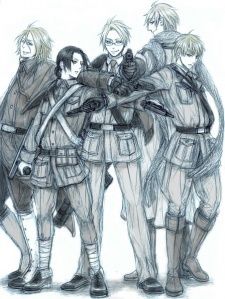|
If you liked
Paniponi Dash!
|
...then you might like
Maria†Holic
|
Same director. Kanako and Himeko are practical twins (besides the latter's superior silliness and - presumed - heterosexuality). Mariya might or might not be likened to a vicious and gender-swapped Becky. Matsurika channels Ichijou, down to even the deadpan eyes. Both animes make use of quirky Shindo-isms/SHAFT-isms (immediately recognizable to fans of the man and company). PPD is significantly more episodic, but both have unusual (crack!) humor.
|
If you liked
Air
|
...then you might like
Byousoku 5 Centimeter
|
Art, backdrop scenery, and color manipulation are spectacular in both. AIR fully develops the fragility of love and difficulty of human connection invoked in 5 cm. Both play on the theme of inevitable loss. 5 cm's brilliant music and use of silence is replicated in AIR.
|
If you liked
Hoshi no Koe
|
...then you might like
Pale Cocoon
|
Both Mikako of Voices and the protagonists of Pale Cocoon are forcibly alienated from Earth. Both stories take place in a depopulated and dystopic future, and emphasize a kind of ethereal nostalgia for the "Home Planet." Both involve elements of ambiguous romance.
|
If you liked
Azumanga Daiou The Animation
|
...then you might like
Kyou no 5 no 2 (TV)
|
Humor in both animes are character-driven and non sequitor. Episodes are each divided into free-standing scenarios. Azumanga Daioh is entirely female-centric, whereas Kyou no Go no Ni is grounded on awkward(ly comedic), inappropriate male-female interaction.
|
If you liked
ef: A Tale of Memories.
|
...then you might like
Clannad: After Story
|
Artwork in both animes is outstanding and avant-garde (same applies to ef - tale of melodies). Both incorporate supernatural characters in surreal settings and heavy doses of symbolism (ef much more so). Ef's characterization is markedly more in-depth. Clannad avoids the ef serie's intense (but well-executed) melodrama, whereas ef avoids Clannad's harem stereotypes.
|
If you liked
Lucky☆Star
|
...then you might like
Hyakko
|
Four schoolgirls and various quirky friends. Both involve decent plays on school-life anime cliches. Hyakko's humor is somewhat weaker (but less random), and lacks Lucky Star's otaku elements.












